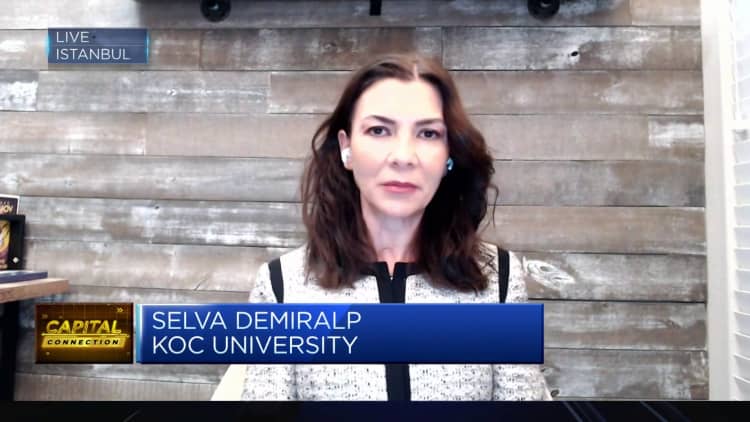As inflation eases in most of the world's major economies, eye-watering price rises continue to blight citizens in Turkey.
Inflation in the country rose to 64.8% on an annual basis in December, an acceleration from 62% in November. This was slightly below expectations of economists polled by Reuters of 65.1%. Month-on-month inflation cooled to 2.9% from 3.3%.
Turkish inflation hit a peak of 85.5% in October 2022. The Turkish lira saw a steep deterioration, increasing the cost of imports and eroding the salaries of the country's many foreign workers sending money abroad.
That came as Turkey's central bank stuck to a controversial monetary policy of lowering interest rates, spearheaded by President Recep Tayyip Erdogan.
However, the central bank made a sharp pivot in June when it began hauling rates higher under its new governor, Hafize Gaye Erkan. They have since been lifted from 8.5% to 42.5%.
The last central bank meeting in December delivered a 250 basis point hike, smaller than the recent run of 500 basis point rises.
Nicholas Farr, emerging Europe economist at Capital Economics, said in a research note at the time that the central bank had not closed the door on its tightening cycle. He also forecast one more 250 basis point hike at its next meeting Jan. 25.
Heading for peak?
Inflation has been back on the rise since June, but market watchers say this cycle should hit its peak by mid-2024.
In a fresh HSBC emerging markets sentiment survey, Turkish bonds were highlighted as a preferred investment for the first time in many years, according to the bank's global head of emerging markets research, Murat Ulgen.
It reflects the increasing credibility of the central bank, Ulgen told CNBC's "Squawk Box Europe" on Wednesday.
"Of course, inflation is still high, but it's losing sequential monthly momentum, and the chances are it's going to peak pretty soon over the next few months, or a quarter, and will start falling," he said, adding that the central bank was likely to deliver "pretty sizeable real interest rates" on an ex-ante basis — constructed before the actual inflation rate is known.
Investors are looking past the current path of inflation and seeing opportunities in currency trades, particularly with the lira stabilizing, he added.

But the current level of rate hikes is unlikely to get the central bank to its year-end 2024 inflation target of 36%, according to Selva Demiralp, professor of economics at Koc University.
Demiralp and her colleagues instead see a reading closer to 50%, with inflation peaking around 75% in the middle of the year due to the cumulative effect of rate hikes and base effects.
"The starting point was a very overheated economy, and consequent tightening is probably not sufficient" to reach the 36% target, she told CNBC's "Capital Connection" on Wednesday.


